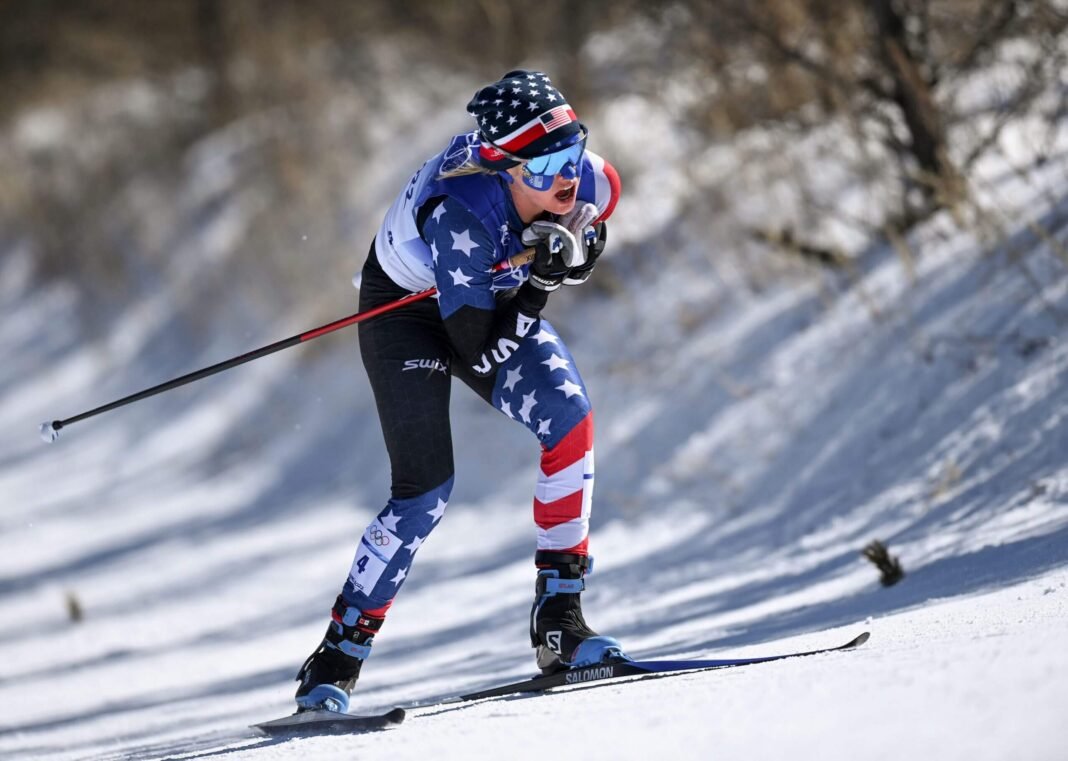The Daily Observer London Desk: Reporter- Judith Benjamin
It’s July, a time of year when Jessie Diggins, the greatest American to ever click into a pair of cross-country skis, is usually deep into her offseason training, the hours of roller skiing and running and strength work that she loves nearly as much as tearing through the snow in Norway in the middle of winter.
There’s something wrong, though. She’s feeling something she has never felt — she’s just not sure she wants to do this anymore.
She’s thinking about the upcoming season, the four months on the road away from her husband, existing in a constant state of weariness, journeys into the “pain cave” in nearly every race. In her 32 years on the planet, she has never had to search for motivation, never dreaded a workout, never wanted to do anything but push her body and mind to the edge of exhaustion.
It was more complicated than that, though.
The eating disorder that she had battled through her teens and early in her career, a condition that is all too prevalent in her sport, was back. That wasn’t supposed to happen. She thought she was over it, something that years of therapy had eradicated from her brain. For weeks, though, she’d been fighting it all over again.
And for the first time, a thought dawned on her:
“I don’t have to do any of this.”
“I don’t need to win another race, as long as I live,” Diggins, a world champion and three-time Olympic medalist, said earlier this fall, recalling the feeling after her summer relapse.
For anyone who has gotten even the slightest glimpse of Diggins’ career — most likely it’s that final, lung-searing sprint across the finish line at the Olympics in Pyeongchang in 2018 to win the first U.S. gold medal in cross-country skiing — the idea that her brain had reached the point where she thought of walking away from ski racing is hard to fathom.
“HERE COMES DIGGINS!”
At the 2018 PyeongChang Olympics, Kikkan Randall and Jessie Diggins won @TeamUSA’s first-ever Olympic gold medal in cross-country skiing.#BestOfTheDecade pic.twitter.com/Y8ZgqzBLzx
— NBC Sports (@NBCSports) December 28, 2019
There are few athletes who experience both training and competition with the joy that Diggins does. And it’s always been this way, during the seasons — and offseasons — when she was a nobody, and the ones when she was an Olympic champion and the world’s best skier.
It’s how Diggins, who is known more as a sprinter than a distance specialist, won her second medal at the Beijing Olympics — a silver in the 30-kilometer race — after a bout of food poisoning made it unclear whether she would even make it to the start line. She blocked out the pain, set her mind to leading her team for one more day, and fought her way to a third Olympic medal after also winning a bronze in the individual sprint earlier in Beijing.
Diggins didn’t bail that day, and she didn’t bail this summer. She will begin another season, her 14th, this weekend in Ruka, Finland.
But it’s not because she wants to chase another chance to stand on a podium. That is not why she raced that day in Beijing, after a night of sweats and vomiting. On the bus to the race, she read an email from her mother, who knew how ill she was, reminding her that she raced because she loved what she did, and loved challenges, and who knows, it might end up being the best days of her life.
Mom was right (other than the emergency medical intervention Diggins required after). But it wasn’t because she ended up with another medal. It was because it felt like a celebration of the community that has propelled her into this life.
There was the email from her mother, the conversations with her husband on the other side of the world, like he so often is, offering her whatever support he could. Two teammates climbed into bed with her in the Olympic Village to help her rest. The wax technicians got her skis tuned just right. Her teammates and skiers from other countries, who knew how sick she had been, trekked across the snow to the final climb, urging her on as her body and her brain began shutting down in the last kilometers.
“I felt like the whole world was cheering me on,” she said last month during a 20-mile run in Central Park in New York, her preferred interview setting.
The support this past summer, perhaps the hardest one of her adult life, was different, but no less impactful. She didn’t know what she was going to hear when she called her coaches and told them she was sick and that she didn’t know if she would be ready for the start of the season, if at all.
No one, she said, pulled out a calendar or built a timeline for coming back. They told her to take care of herself as best she could, ask for whatever she needed, and not do anything that put her health at risk. It was as though they didn’t care whether she ever raced again.
That was refreshing for Diggins, especially given all the questions that elite athletes have raised in recent years about whether the U.S. Olympic and Paralympic Committee saw them as medal-winning machines or human beings. The organization and its national governing bodies, which oversee the individual sports directly, have been trying to pay as much attention to the mental wellness of athletes as to their physical health and offer psychological services that don’t prioritize sports performance.
“You want to be able to live and compete both happily and healthily,” said Alex Cohen, a psychologist with the USOPC who works mainly with winter sports athletes. “They go hand-in-hand.”



